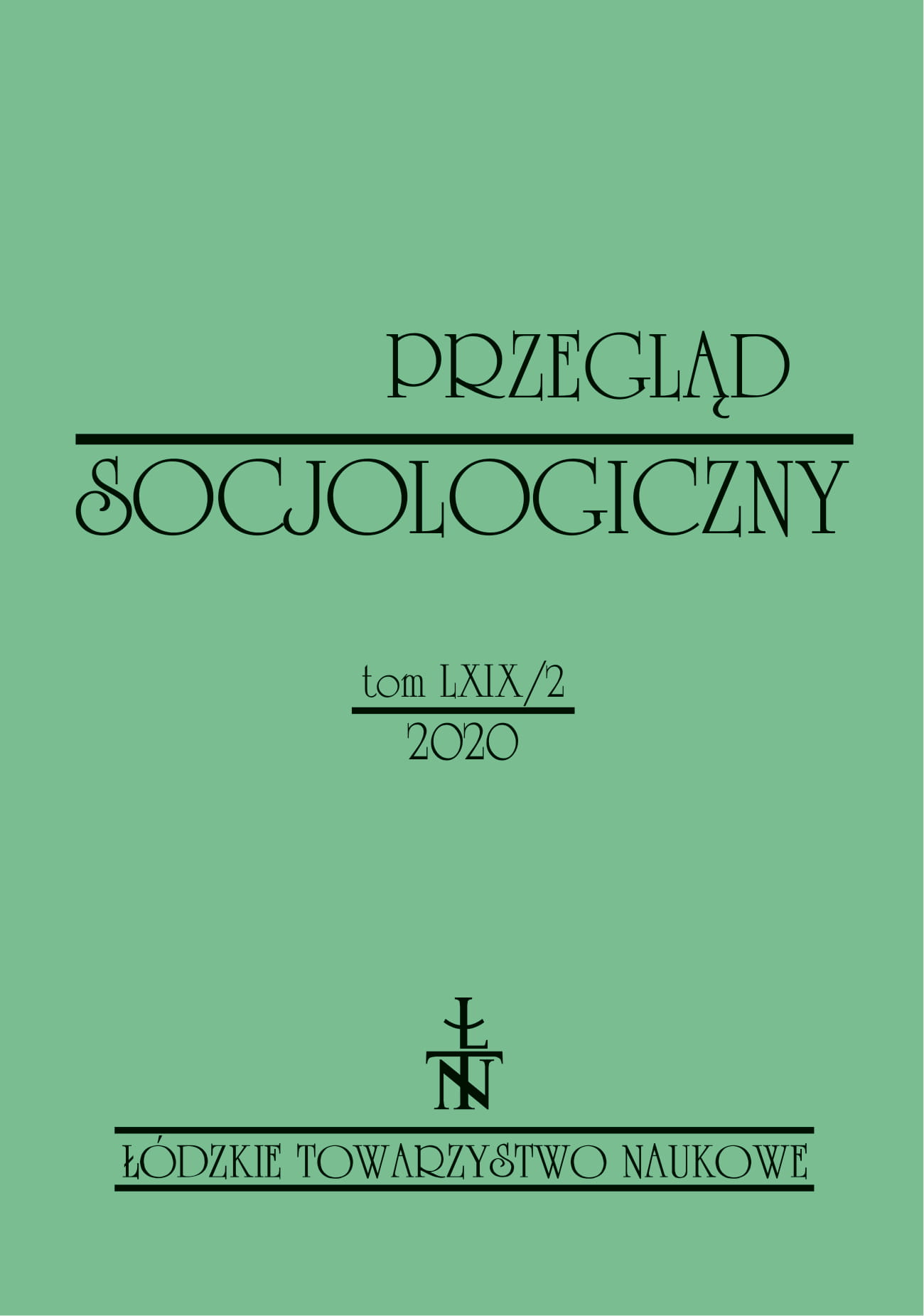Strategie zaangażowania rosyjskich organizacji pozarządowych w proces wdrażania rozwiązań polityki społecznej
DOI:
https://doi.org/10.26485/PS/2020/69.2/3Słowa kluczowe:
„NGO-izacja” (NGO-isation), polityka społeczna, klientelizm, opieka nad osobami starszymi, RosjaAbstrakt
Chociaż władze rosyjskie uważają społeczeństwo obywatelskie za zagrożenie dla ich rządów, to społeczne organizacje pozarządowe (NGO) są oceniane pozytywnie przez instytucje państwowe na wszystkich poziomach władzy. W przeciwieństwie do organizacji broniących praw człowieka czy też aktywistów politycznych społecznie ukierunkowane organizacje trzeciego sektora raczej nie są krytykowane przez maszynę propagandową, lecz wypełniają obecnie kluczową rolę we wdrażaniu polityki społecznej w Rosji. Analizując trajektorie relacji z władzą 18 organizacji pozarządowych z Petersburga, zajmujących się opieką nad osobami starszymi, artykuł omawia trzy typy relacji między NGO a instytucjami państwa: NGO wspierające politykę państwa poprzez bycie częścią tej polityki; NGO uzupełniające polityki państwa w obszarach, gdzie państwo nie potrafi odpowiednio rozwiązać problemów; oraz NGO zastępujące państwo, a w niektórych przypadkach sprawujące władzę nad lokalnymi państwowymi instytucjami społecznymi.
Bibliografia
Alvarez Sonia E. 2009. “Beyond NGO-ization?: Reflections from Latin America”. Development 52(2): 175–184.
Barber Martin, Cameron Bowie. 2008. “How international NGOs could do less harm and more good”. Development in Practice 18(6): 748–754.
Barsukova Svetlana Y. 2004. Nerynochnye obmeny mezhdu rossiyskimi domokhozyaystvami: Teoriya i praktika retsiproknosti. Moscow: HSE Press.
Batley Richard. 2011. “Structures and strategies in relationships between non-government service providers and governments”. Public Administration and Development 31(4): 306–319.
Benevolenski Vladimir B., Stefan Toepler. 2017. “Modernising social service delivery in Russia: Evolving government support for non-profit organisations”. Development in Practice 27(1): 64–76.
Bromme Rainer, Harm Tillema. 1995. “Fusing experience and theory: The structure of professional knowledge”. Learning and instruction 5(4): 261–67.
Cammett Melani, Lauren M. MacLean (eds.). 2014. The politics of non-state social welfare. Itaca: Cornell University Press.
Cook Linda J. 2007. “Negotiating welfare in postcommunist states”. Comparative Politics 40(1), 41–62.
Cook Linda J., Vinogradova Elena V. 2006. NGOs Civic Society and Social Policy in Russia’s Regions, Washington: The National Council for Eurasian and East European Research (Title V III Program).
Daly Mary, Jane Lewis. 2000. “The concept of social care and the analysis of contemporary welfare states”. The British Journal of Sociology 51(2): 281–298.
Danilova Natalya. 2010. “The development of an exclusive veterans’ policy: The case of Russia”. Armed Forces & Society 36(5): 890–916.
Evans Alfred B., Laura A. Henry, Lisa McIntosh Sundstrom. 2006. Russian civil society: A critical assessment. London, New York: M.E. Sharpe.
Evers Adalbert. 1995. “Part of the welfare mix: The third sector as an intermediate area”. Voluntas: International Journal of Voluntary and Nonprofit Organizations 6(2): 159–182.
Geyer Robert. 2001. “Can the European Union (EU) social NGOs co-operate to promote EU social policy?”. Journal of Social Policy 30(3): 477–493.
Gibson James L. 2001. “Social networks, civil society, and the prospects for consolidating Russia’s democratic transition”. American Journal of Political Science, 51–68.
Henderson Sarah L. 2002. “Selling civil society: Western aid and the nongovernmental organization sector in Russia”. Comparative Political Studies, 138–167.
Hemment Julie. 2012. “Nashi”, youth voluntarism and Potemkin NGOs: Making sense of civil society in post-soviet Russia”. Slavic Review 71(2): 234–260.
Hills John. 2011. “The changing architecture of the UK welfare state”. Oxford Review of Economic Policy 27(4): 589–607.
Hvid Helge, Annette Kamp (eds.). 2012. Elderly care in transition: Management, meaning and identity at work: A Scandinavian perspective. Copenhagen: Copenhagen Business School Press.
Jalali Rita. 2013. “Financing empowerment? How foreign aid to Southern NGOs and social movements undermines grass-roots mobilisation”. Sociology Compass 7(1): 55–73.
Jarvis Darryl S.L. 2014. “Policy transfer, neo-liberalism or coercive institutional isomorphism? Explaining the emergence of a regulatory regime for quality assurance in the Hong Kong higher education sector”. Policy and Society 33(3): 237–252.
Krause Monika. 2014. The good project: Humanitarian relief NGOs and the fragmentation of reason. Chicago: Chicago University Press.
Kulmala Meri, Anna Tarasenko. 2016. “Interest representation and social policy making: Russian veterans’ organisations as brokers between the state and society”. Europe-Asia Studies 68(1): 138–163.
Kulmala Meri. 2016. “Post-soviet political: “Social” and” political” in the work of Russian socially oriented CSOs”. Demokratizatsiya: The Journal of Post-Soviet Democratization 24(2): 199–224.
Ljubownikow Sergej, Jo Crotty, Peter W. Rodgers. 2013. “The state and civil society in Post- Soviet Russia: The development of a Russian-style civil society”. Progress in Development Studies 13(2): 153–166.
Olompiev Konstantin S. 2017. “Vlastnye instituty i grazhdanskoe obshhestvo: Evoljucija vzaimootnoshenij v perehodnyj period otechestvennoj istorii (1985–1991 gody)” [State Institutions and civil society: Relationship evolution in transitional period of patriotic history
in 1985–1991]. Ars Administrandi 9(1): 1–15.
Oosterlynck Stijn, Yuri Kazepov, Andreas Novy, Pieter Cools, Florian Wukovitsch, Tatiana
Saruis, Eduardo Barberis, Bernhard Leubolt. 2013. Exploring the multi-level governance of welfare provision and social innovation: Welfare mix, welfare models and rescaling. Antwerp: Improve Working Papers.
Powell Martin, Armando Barrientos. 2004. “Welfare regimes and the welfare mix”. European Journal of Political Research 43(1): 83–105.
Rosstat. 2016. Aged Population Demographics. Rosstat. http://www.gks.ru/wps/wcm/connect/ rosstat_main/rosstat/ru/statistics/population/generation/# [access: 10.03.2020].
Scheba Andreas, Irmeli Mustalahti. 2015. “Rethinking ‘expert’knowledge in community forest management in Tanzania”. Forest Policy and Economics 60: 7–18.
Shefner Jon. 2008. The illusion of civil society: Democratisation and community mobilisation in low income Mexico. University Park: Pennsylvania State University Press.
Simonazzi Annamaria. 2009. “Care regimes and national employment models”. Cambridge Journal of Economics 33(2): 211–232.
Tarasenko Anna. 2015. “Russian welfare reform and social NGOs: Strategies for claim-making and service provision in the case of Saint Petersburg”. East European Politics 31(3): 294–313.
Tarasenko Anna. 2018. “Russian non-profit organisations in service delivery: Neoliberal and statist social policy principles intertwined”. Europe-Asia Studies 70(4): 514–530.
Thomas Bejoy K., Roldan Muradian, Gerard de Groot, Arie de Ruijter. 2010. “Confronting or complementing? A case study on NGO–state relations from Kerala, India”. Voluntas: International Journal of Voluntary and Nonprofit Organizations 21(3): 358–370.
Tronto Joan. 1993. Moral boundaries: A political argument for an ethic of care. New York: Routledge.
Verbruggen Sandra, Johan Christiaens, Koen Milis. 2011. “Can resource dependence and coercive isomorphism explain nonprofit organizations’ compliance with reporting standards?”. Nonprofit and Voluntary Sector Quarterly 40(1): 5–32.



